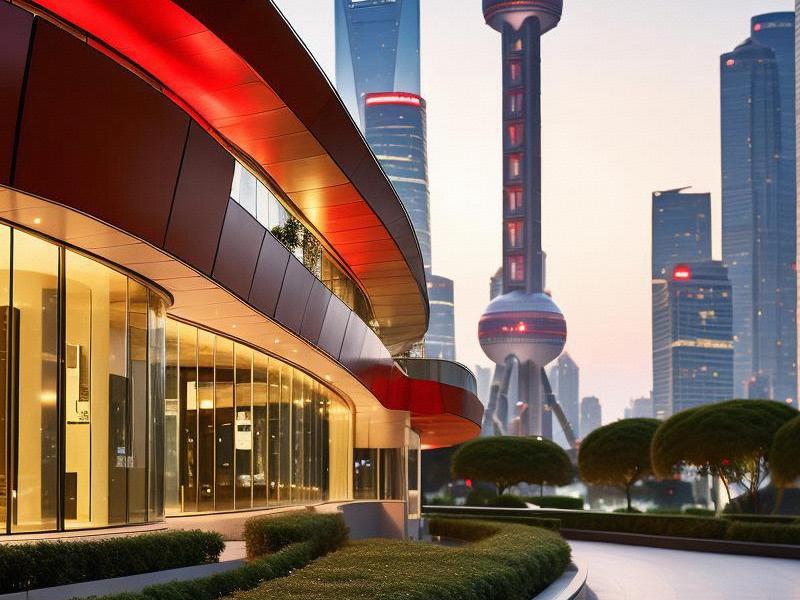
Shanghai, the bustling financial capital of China, has long been a symbol of the country's rapid economic growth and urbanization. Over the past few decades, the city has undergone a profound transformation, emerging as a global leader in urban innovation and sustainability. This journey is not just about economic progress but also about creating a livable, inclusive, and environmentally friendly metropolis for its residents.
The Urban Landscape: A Blend of Tradition and Modernity
Shanghai's urban landscape is a fascinating blend of tradition and modernity. The iconic skyline, dominated by the Oriental Pearl Tower, the Shanghai Tower, and the Jin Mao Tower, stands as a testament to the city's rapid development. Yet, amidst this modernity, the city has managed to preserve its rich cultural heritage, with areas like the French Concession and the Old City offering a glimpse into its colonial past.
The Bund, a historic waterfront area, is another example of Shanghai's ability to harmonize the old with the new. Once a symbol of foreign concessions, the Bund has been revitalized with sleek skyscrapers, luxury hotels, and high-end shopping malls, making it a popular destination for both locals and tourists.
Strategic Initiatives for Urban Innovation
Shanghai's transformation is underpinned by a series of strategic initiatives aimed at fostering urban innovation. The city has set ambitious goals to become a global center for science and technology, with a focus on areas such as artificial intelligence, biotechnology, and advanced manufacturing.
One of the key drivers of this initiative is the Zhangjiang Hi-Tech Park, often referred to as "China's Silicon Valley." This park houses numerous high-tech companies, research institutions, and startups, attracting top talent from around the world. It has played a pivotal role in advancing Shanghai's position in the global tech ecosystem.
上海龙凤419油压论坛 Another significant initiative is the Smart City project, which aims to integrate advanced technologies such as the Internet of Things (IoT), big data, and artificial intelligence into urban management and services. This project has led to the development of smart transportation systems, energy-efficient buildings, and digital platforms for public services, enhancing the quality of life for residents.
Commitment to Sustainability
Sustainability is a cornerstone of Shanghai's urban transformation. The city faces significant challenges related to environmental degradation, traffic congestion, and resource management. To address these issues, Shanghai has implemented a range of policies and projects aimed at promoting sustainable development.
One of the most notable efforts is the construction of the world's first large-scale carbon-neutral district, known as the "Green Energy Demonstration Zone." This district integrates renewable energy sources, energy-efficient buildings, and green infrastructure to achieve net-zero carbon emissions. It serves as a model for other cities looking to transition to a low-carbon economy.
Shanghai is also investing heavily in public transportation to reduce traffic congestion and air pollution. The city's extensive metro network, which includes the world's longest metro line, has made commuting more convenient and environmentally friendly. Additionally, the introduction of electric buses and bike-sharing programs has further encouraged sustainable modes of transportation.
Enhancing Quality of Life
上海贵族宝贝龙凤楼 Shanghai's transformation is not just about economic growth and sustainability but also about enhancing the quality of life for its residents. The city has made significant strides in improving healthcare, education, and cultural amenities.
In healthcare, Shanghai has established world-class medical facilities and research institutions, attracting patients and experts from around the globe. The city's healthcare system emphasizes preventive care and personalized medicine, ensuring that residents have access to high-quality medical services.
Education is another area where Shanghai has excelled. The city is home to some of the best universities in China, including Fudan University and Tongji University, which are renowned for their academic excellence and research capabilities. Shanghai's education system focuses on fostering innovation and critical thinking, preparing students for the challenges of the future.
Cultural amenities in Shanghai are diverse and vibrant, reflecting the city's rich history and cosmopolitan character. From world-class museums and theaters to art galleries and music festivals, Shanghai offers a wide range of cultural experiences for residents and visitors alike. The city's commitment to preserving and promoting its cultural heritage ensures that it remains a vibrant and dynamic urban center.
Global Role and Future Prospects
As a global hub of urban innovation and sustainability, Shanghai plays a crucial role in shaping the future of cities worldwide. The city's experiences and best practices serve as valuable lessons for other urban centers facing similar challenges.
419上海龙凤网 Shanghai's success can be attributed to its forward-thinking leadership, innovative policies, and collaborative approach. The city has embraced globalization and technological advancements, positioning itself as a leader in urban development.
Looking ahead, Shanghai continues to chart a course toward a more sustainable and livable future. The city is exploring new technologies such as autonomous vehicles, smart grids, and digital twins to further enhance urban management and services. It is also strengthening its partnerships with international organizations and cities to share knowledge and best practices.
Conclusion
Shanghai's journey of urban transformation is a remarkable story of resilience, innovation, and sustainability. The city has successfully balanced rapid economic growth with environmental stewardship and social progress, creating a model for other urban centers to follow.
As Shanghai continues to evolve, it remains committed to enhancing the quality of life for its residents and contributing to global efforts to address climate change and promote sustainable development. The city's vision for the future is one of inclusivity, innovation, and harmony, ensuring that it remains a beacon of hope and opportunity in an ever-changing world.
In conclusion, Shanghai's transformation is not just about building skyscrapers and developing advanced technologies; it is about creating a city that is livable, inclusive, and environmentally friendly. By embracing innovation and sustainability, Shanghai is setting a new standard for urban development, inspiring cities around the world to follow in its footsteps.
